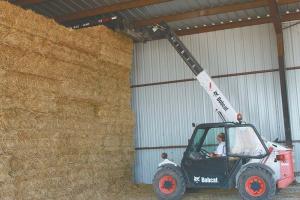FFA Project Became Young Man’s Business
 ✖  |
Ben Niendick’s FFA bale sale project is now a year-round business. Niendick makes small square and big round wheat straw bales on area farms, including his Wellington, Mo., family farm. The bales are sold to a variety of markets, from construction sites to nurseries, farms, gardens and home decorators.
“We sold a lot of straw to a big pipeline project in Oklahoma one year and have sold straw as far east as Quincy, Ill.,” says Niendick. “The small square bales are wire tied, which not a lot of people do anymore. The wires hold up better than twine, which customers appreciate.”
Niendick does what he can to make sure customers get what they want. His straw is clean and bright. Every field is inspected and certified to be weed-free before it’s baled. While not necessary for home and farm sales, nurseries and construction sites need the straw to be noxious weed free.
“It is a little costly, but the certification adds value to the straw,” says Niendick. “More importantly, it is a good selling point. People feel better about buying the straw when it is clean and bright.”
Niendick’s straw business grew rapidly the first few years, spiked with the pipeline business, but has since leveled off. He sold 1,600 bales his first year in 2008, doubling that the next. This past year he sold around 31,000 small square bales while still in college.
“Now that I’m out of college, I’ll have more time to sell more straw.”
How much he has to sell can depend on the weather. In 2015 a rainy summer resulted in only half his expected number of bales.
“I had to buy big square bales, break them down and rebale in small squares to fulfill the contracts I had in place,” recalls Niendick.
He runs 3 small square balers and thirteen, 28-ft. box trailers for delivering bales. Each trailer can hold up to 250 bales. Two trailers can be hooked together for transit, allowing Niendick to deliver from 400 to 500 bales in a trip. Bales are priced by quantity and distance to be hauled.
“I can get most orders delivered within 2 days,” he says. “Good customer service is important. You have to be able to get along with people.”
Niendick says his biggest challenge is finding enough wheat straw. This year he lost one of his biggest growers when he chose not to plant wheat. In addition to finding new suppliers, he is also diversifying to find new markets and more uses for equipment.
“I had the opportunity to plant some alfalfa and am baling and selling it as well,” says Niendick.
Contact: FARM SHOW Followup, Niendick Straw and Cattle, 13875 Highway 131, Wellington, Mo. 64097 (ph 816 824-6969; niendickstrawandcattle.wordpress.com).

Click here to download page story appeared in.
Click here to read entire issue
FFA Project Became Young Man’s Business BALE HANDLING Ben Niendick’s FFA bale sale project is now a year-round business Niendick makes small square and big round wheat straw bales on area farms including his Wellington Mo family farm The bales are sold to a variety of markets from construction sites to nurseries farms gardens and home decorators “We sold a lot of straw to a big pipeline project in Oklahoma one year and have sold straw as far east as Quincy Ill ” says Niendick “The small square bales are wire tied which not a lot of people do anymore The wires hold up better than twine which customers appreciate ” Niendick does what he can to make sure customers get what they want His straw is clean and bright Every field is inspected and certified to be weed-free before it’s baled While not necessary for home and farm sales nurseries and construction sites need the straw to be noxious weed free “It is a little costly but the certification adds value to the straw ” says Niendick “More importantly it is a good selling point People feel better about buying the straw when it is clean and bright ” Niendick’s straw business grew rapidly the first few years spiked with the pipeline business but has since leveled off He sold 1 600 bales his first year in 2008 doubling that the next This past year he sold around 31 000 small square bales while still in college “Now that I’m out of college I’ll have more time to sell more straw ” How much he has to sell can depend on the weather In 2015 a rainy summer resulted in only half his expected number of bales “I had to buy big square bales break them down and rebale in small squares to fulfill the contracts I had in place ” recalls Niendick He runs 3 small square balers and thirteen 28-ft box trailers for delivering bales Each trailer can hold up to 250 bales Two trailers can be hooked together for transit allowing Niendick to deliver from 400 to 500 bales in a trip Bales are priced by quantity and distance to be hauled “I can get most orders delivered within 2 days ” he says “Good customer service is important You have to be able to get along with people ” Niendick says his biggest challenge is finding enough wheat straw This year he lost one of his biggest growers when he chose not to plant wheat In addition to finding new suppliers he is also diversifying to find new markets and more uses for equipment “I had the opportunity to plant some alfalfa and am baling and selling it as well ” says Niendick Contact: FARM SHOW Followup Niendick Straw and Cattle 13875 Highway 131 Wellington Mo 64097 ph 816 824-6969; niendickstrawandcattle wordpress com
To read the rest of this story, download this issue below or click
here to register with your account number.







